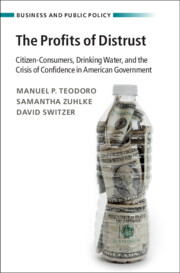 The Profits of Distrust
The Profits of Distrust Book contents
- The Profits of Distrust
- Business and Public Policy
- The Profits of Distrust
- Copyright page
- Dedication
- Epigraph
- Contents
- Figures
- Tables
- Preface
- Acknowledgments
- 1 Basic Services and Trust in Government
- 2 The Profits of Distrust
- 3 (Dis)trust at the Tap
- 4 Hyperopia and Performative Trust
- 5 Speaking Up or Opting Out
- 6 Geographies of Alienation
- 7 When Trust Pays
- 8 Basic Services and Rebuilding Legitimacy
- The Plan
- Book part
- References
- Index
- Other books in the series
5 - Speaking Up or Opting Out
Moral Trust, Voice, and Exit
Published online by Cambridge University Press: 18 August 2022
- The Profits of Distrust
- Business and Public Policy
- The Profits of Distrust
- Copyright page
- Dedication
- Epigraph
- Contents
- Figures
- Tables
- Preface
- Acknowledgments
- 1 Basic Services and Trust in Government
- 2 The Profits of Distrust
- 3 (Dis)trust at the Tap
- 4 Hyperopia and Performative Trust
- 5 Speaking Up or Opting Out
- 6 Geographies of Alienation
- 7 When Trust Pays
- 8 Basic Services and Rebuilding Legitimacy
- The Plan
- Book part
- References
- Index
- Other books in the series
Summary
This chapter examines the relationship between moral trust in government and the choice of citizen-consumers to exercise voice and exit. We find that when faced with tap water failure, ethnic and racial minorities are less likely to voice their concerns to utilities due to their historical marginalization in the United States. This disparity in the likelihood of exercising voice is most prevalent among poor populations, with the effect especially pronounced among Hispanics. Further, we find that citizen-consumers who lack moral trust in government are more likely to consume bottled water, signifying exit from publicly provided services. Exit from public services has downstream political effects. Citizen-consumers who drink bottled water are less likely to engage in politics. As bottled water consumption increases, voting rates decrease. The consequences of declining trust in government and the turn away from public services strikes at the heart of democracy itself. When individuals do not trust government to provide basic services, there is little reason for them to engage in public life more broadly.
Keywords
- Type
- Chapter
- Information
- The Profits of DistrustCitizen-Consumers, Drinking Water, and the Crisis of Confidence in American Government, pp. 125 - 145Publisher: Cambridge University PressPrint publication year: 2022


